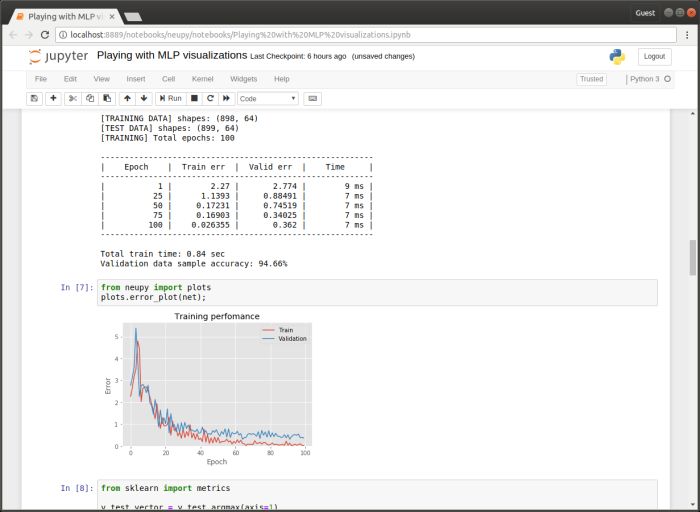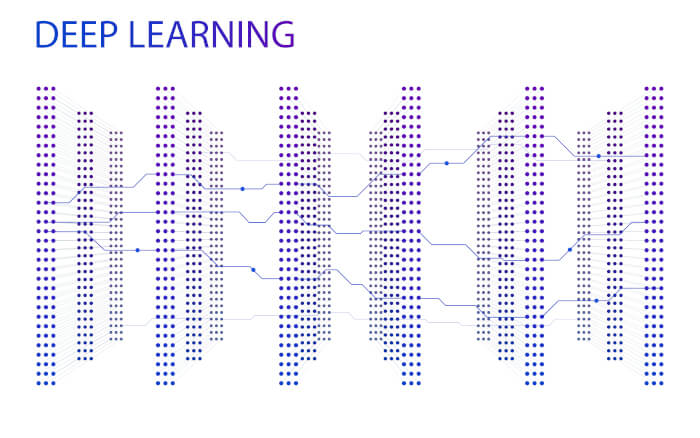NeuPy is an open source Python library for Artificial Neural Networks and Deep Learning.
NeuPy supports many different types of Neural Networks from a simple perceptron to deep learning models.
NeuPy is based on the Theano framework. This allows users to easily train neural networks with constructible architectures on GPU.
Features include:
- Deep Learning.
- Reinforcement Learning (RL).
- Convolutional Neural Networks (CNN).
- Recurrent Neural Networks (RNN).
- Restricted Boltzmann Machine (RBM).
- Multilayer Perceptron (MLP).
- Networks based on the Radial Basis Functions (RBFN).
- Associative and Autoasociative Memory.
- Ensemble Networks.
- Competitive Networks.
- Basic Linear Networks.
- Regularization Algorithms.
- Step Update Algorithms.
- Supports lots of different training algorithms based on the backpropagation:
- Classic Gradient Descent – an optimization algorithm often used for finding the weights or coefficients of machine learning algorithms, such as artificial neural networks and logistic regression.
- Mini-batch Gradient Descent – a variation of the gradient descent algorithm that splits the training dataset into small batches that are used to calculate model error and update model coefficients.
- Conjugate Gradient – solve a symmetric positive-definite system of linear equations of dimension N in exactly N steps.
- quasi-Newton – find zeroes or local maxima and minima of functions, as an alternative to Newton’s method.
- Levenberg-Marquardt – solves generic curve-fitting problems.
- Hessian – a matrix of all possible calculus second derivatives for a function.
- Hessian diagonal.
- Momentum – a method that helps accelerate SGD in the relevant direction and dampens oscillations.
- RPROP – resilient backpropagation, a learning heuristic for supervised learning in feedforward artificial neural networks. It’s widely regarded as one of the best performing first-order learning methods for neural networks with arbitrary topology.
- iRPROP+ – a modification of RPROP with a weight-backtracking scheme.
- Quickprop – an implementation of the error backpropagation algorithm.
- Adadelta – an extension of Adagrad that seeks to reduce its aggressive, monotonically decreasing learning rate.
- Adagrad – an algorithm for gradient-based optimization. It’s useful for dealing with sparse data.
- RMSProp – an adaptive learning rate method proposed by Geoff Hinton.
- Adam – Adaptive Moment Estimation, an algorithm for first-order gradient-based optimization of stochastic objective functions, based on adaptive estimates of lower-order moments.
- AdaMax – a special case of Adam.
Website: neupy.com
Support: Documentation, Cheat Sheet, GitHub code repository
Developer: Yurii Shevchuk
License: MIT License

Neupy is written in Python. Learn Python with our recommended free books and free tutorials.
Return to Deep Learning with Python
| Popular series | |
|---|---|
| The largest compilation of the best free and open source software in the universe. Each article is supplied with a legendary ratings chart helping you to make informed decisions. | |
| Hundreds of in-depth reviews offering our unbiased and expert opinion on software. We offer helpful and impartial information. | |
| The Big List of Active Linux Distros is a large compilation of actively developed Linux distributions. | |
| Replace proprietary software with open source alternatives: Google, Microsoft, Apple, Adobe, IBM, Autodesk, Oracle, Atlassian, Corel, Cisco, Intuit, SAS, Progress, Salesforce, and Citrix | |
| Awesome Free Linux Games Tools showcases a series of tools that making gaming on Linux a more pleasurable experience. This is a new series. | |
| Machine Learning explores practical applications of machine learning and deep learning from a Linux perspective. We've written reviews of more than 40 self-hosted apps. All are free and open source. | |
| New to Linux? Read our Linux for Starters series. We start right at the basics and teach you everything you need to know to get started with Linux. | |
| Alternatives to popular CLI tools showcases essential tools that are modern replacements for core Linux utilities. | |
| Essential Linux system tools focuses on small, indispensable utilities, useful for system administrators as well as regular users. | |
| Linux utilities to maximise your productivity. Small, indispensable tools, useful for anyone running a Linux machine. | |
| Surveys popular streaming services from a Linux perspective: Amazon Music Unlimited, Myuzi, Spotify, Deezer, Tidal. | |
| Saving Money with Linux looks at how you can reduce your energy bills running Linux. | |
| Home computers became commonplace in the 1980s. Emulate home computers including the Commodore 64, Amiga, Atari ST, ZX81, Amstrad CPC, and ZX Spectrum. | |
| Now and Then examines how promising open source software fared over the years. It can be a bumpy ride. | |
| Linux at Home looks at a range of home activities where Linux can play its part, making the most of our time at home, keeping active and engaged. | |
| Linux Candy reveals the lighter side of Linux. Have some fun and escape from the daily drudgery. | |
| Getting Started with Docker helps you master Docker, a set of platform as a service products that delivers software in packages called containers. | |
| Best Free Android Apps. We showcase free Android apps that are definitely worth downloading. There's a strict eligibility criteria for inclusion in this series. | |
| These best free books accelerate your learning of every programming language. Learn a new language today! | |
| These free tutorials offer the perfect tonic to our free programming books series. | |
| Linux Around The World showcases usergroups that are relevant to Linux enthusiasts. Great ways to meet up with fellow enthusiasts. | |
| Stars and Stripes is an occasional series looking at the impact of Linux in the USA. | |
